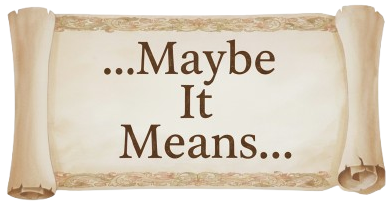We all know the story of David and Goliath, and the way David prepared to meet the giant. We know that he chose stones from a creek, but do we know why he chose five? Did God already tell us why? Consider these passages about the giants in the land from the time of the Exodus through the time of David:
Numbers 13:22, 33 They went up through the Negev and came to Hebron, where Ahiman, Sheshai and Talmai, the descendants of Anak, lived….” We saw the Nephilim there (the descendants of Anak come from the Nephilim). We seemed like grasshoppers in our own eyes, and we looked the same to them.”
Joshua 11:21,22 At that time Joshua went and destroyed the Anakites from the hill country: from Hebron, Debir and Anab, from all the hill country of Israel. Joshua totally destroyed them and their towns. No Anakites were left in Israelite territory; only in Gaza, Gath and Ashdod did any survive.
1 Samuel 17:4,8,21,32 A champion named Goliath, who was from Gath, came out of the Philistine camp. He was over nine feet tall… Goliath stood and shouted to the ranks of Israel. “Why do you come out and line up for battle? Am I not a Philistine,… Israel and the Philistines were drawing up their lines facing each other….David said to Saul, “Let no one lose heart on account of this Philistine; your servant will go and fight him.”… Then he took his staff in his hand, chose five smooth stones from the stream, put them in the pouch of his shepherd’s bag and, with his sling in his hand, approached the Philistine.
The general practice in Caanan when Joshua arrived was for each town which could afford one hired a giant, offspring of Rapha, descendant of Anak, one of the Nephilim, to be their “champion” in war. At the time warfare consisted mostly of close hand-to-hand combat, and the reach advantage of the giant was considerable and usually provided great results. A great visual of this is found in the movie Gladiator, which opens with the Romans battling in Germania. The Germania giant takes his stand on a rock and uses his reach to kill those who dare get close enough.
This practice continues into the time of David. Saul, the Israelite chosen for his hight (1 Samuel 9:2 (Kish) had a son named Saul, an impressive young man without equal among the Israelites – a head taller than any of the others.) was king of Israel, but he was not as big as Goliath. David surveiled the battle array, and based on what he saw he chose five stones from the brook.
I suggest that David saw two lines parallel to each other, with “sidelines” with anyone who came to watch. We know that Goliath had at least four relatives in the business working for other cities, and I think four were on hand to see their kin show his stuff. David saw them and reasoned that, when he killed Goliath, he would have to take on the revenge of the four related giants/champions, so he picked a stone for each of them. They chose to flee instead of fight without getting paid for their services. During his reign David’s men killed those four.
2 Samuel 21:15-22 Once again there was a battle between the Philistines and Israel….And Ishbi-Benob, one of the descendants of Rapha,…At that time Sibbecai …killed Saph, one of the descendants of Rapha… In another battle with the Philistines, at Gob, Elhanan…killed Goliath the Gittite… In still another battle, which took place in Gath, there was a huge man with six fingers on each hand and six toes on each foot…He also was descended from Rapha….Jonathan…killed him. These four were descendants of Rapha, and they fell at the hands of David and his men.
To apply this consider that the enemy may have more than one temptation to use against us at any given time, and it would be good for us to be prepared to deal with both the main temptation and the reserve temptations.
